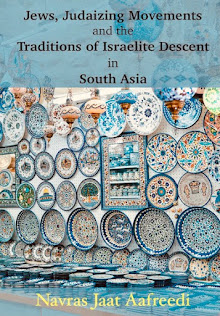A talk given by Dr Navras Jaat Aafreedi
recently at the Sephardi Synagogue
Dr.
Myer Samra, The Sephardi Synagogue Pesach, 2013
Dr Navras Jaat Aafreedi, the only
academic in India today with a focus on Jewish studies, visited Sydney recently
for the conference organized by the Australian Association for Jewish Studies.
While here, Dr Aafreedi addressed a number of Jewish groups, discussing matters
as diverse as Jews in Bollywood film industry, Muslim-Jewish relations in
India, Muslim involvement in Hebrew teaching and Hebrew calligraphy, and the
surprising popularity of Hitler in a country where Jews have not experienced
anti-Semitism.
We
were fortunate to have Dr Aafreedi talk on the topic of the tradition of
Israelite origins among the Pathans who hail from the border areas of
Afghanistan and Pakistan, a tradition which goes back many centuries and has
been discussed in the writings of Jewish, Muslim and Christian travellers. The
Pathans are said to refer to themselves as Bani-Israel though they do not
identify as “Jews”.
A
number of tribes have names like those of the ancient Israelite tribes; some
practice levirate marriage (the brother marrying his deceased brother’s widow),
light candles on Friday, and wear a cloth similar to the Jews’ Tallith.
Dr
Aafreedi indicated that he himself belongs to the “Afridi” Pathan tribe, which
has a tradition of connection to the tribe of Ephraim in the Bible. Growing up
in a diasporic Pathan community in Uttar Pradesh in India, he did not hear of
this tradition when he was a child but was fascinated when he became aware of
it. This is the seed that sparked Dr Aafreedi’s interest in Jewish studies and
the Jewish people, and he has worked endlessly on interfaith dialogue to imrove
the image of the Jews and Israel among Indians. He was also responsible for
organizing a retrospective of films about the Holocaust, of which most Indians
have little or no knowledge.
The
audience at the Sephardi Synagogue were clearly impressed with Dr Aafreedi’s
warmth, his approachability and engaging personality – and questions after the
talk continued long into the evening.
The
evening was capped by a presentation by Jan Poddebsky, of a copy of the book
“The Eye of Paradise” by Moses Aaron, containing stories told to him as a child
by his grandmother and his father, the late Aaron Aaron.
Part 1
Part 2
Part 3
Part 4
Part 5
Part 6
Part 7









.jpg)

















